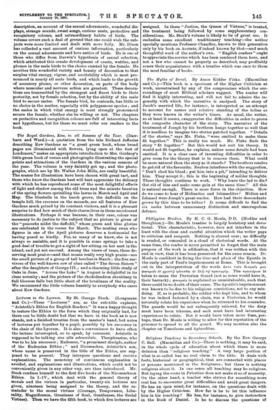Lectures in the Lyceum. By St. George Stock. (Longmans and
Co.)—These "Lectures" are, as the sub-title explains, "Aristotle's Ethics for English Readers." It was a happy thought to restore the Ethics to the form which they originally had, for there can be little doubt but that we have in the book as it now stands, not a finished treatise from the master's hand, but notes of lectures put together by a pupil, possibly by his successor in the chair of the Lyceum. It is also a convenience to have often the lecture interrupted, so to speak, by comment. Aristotle is supposed to be talking sine laic& solemnitate. Theophrastue, who was to be his successor ; Eudemus, "a prominent disciple, author of the Eudemian Ethics ; " and Nicomachus, Aristotle's son, whose name is preserved in the title of the Ethics, are sup- posed to be present. They interpose questions and receive explanations. The monotony of continuous explanation is avoided, and explanations and illustrations, which could not be conveniently given in any other way, are thus introduced. Mr. Stock confines himself to the first five books of the Nicomachean
Ethics. In which deal with the general theory of morals and the virtues in particular, twenty-six lectures are given, nineteen being assigned to the theory, and the re- mainder to the moral virtues (Courage, Temperance, Libe- rality, Magnificence, Greatness of Soul, Gentleness, the Social Virtues). Then we have the fifth book, to which five lectures are
assigned. In these "Justice, the Queen of Virtues," is treated, the treatment being followed by some supplementary con- siderations. Mr. Stock's volume is likely to be of great use. It embodies some excellent traditionary teaching—the author specially mentions Professor Chandler, known to this generation only by his book on Accents, if indeed known by that—and much thoughtful work of the author's own. "English readers" ought to appreciate the service which has been rendered them here, and not a few who cannot be properly so described, may profitably renew their acquaintance with a treatise which was once to them the most familiar of books.


















































 Previous page
Previous page